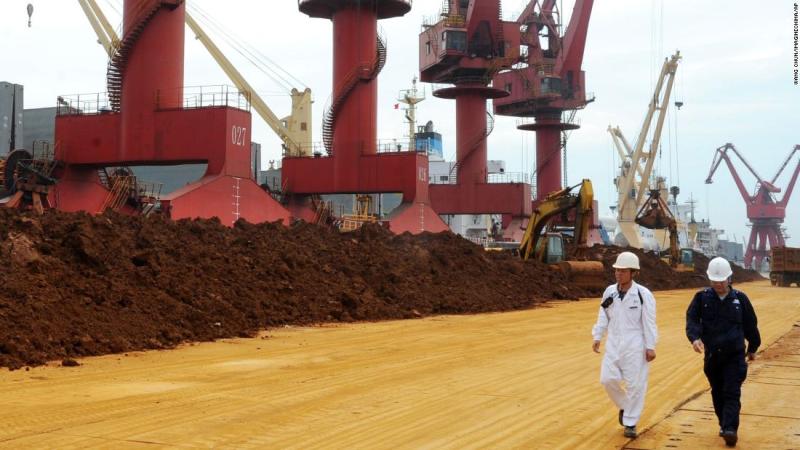A shortage of these metals could make the climate crisis worse
By: Charles Riley (CNN)


Continuing to party while the world burns and hoping for a magical technological solution won't end well. We are on track to see the largest transfer of income and wealth from the economic bottom to the top in the history of the world. A few people are going to become unbelievably wealthy selling technology and speculating in commodities.
Recycling the fossil fuel infrastructure and existing fleet of vehicles cannot provide the needed metals and materials for transitioning to alternative energy. More intensive mining and refining are necessary to make an all electric future a reality. We cannot mitigate climate change with technology unless we drastically increase exploitation of natural resources.
One way to avoid the rather obvious consequences of pursuing a technology driven response to climate change is to begin scrutinizing how and why we are using energy. Curbing consumption of energy reduces fossil fuel use now and requires less alternative energy in the future. We can't keep partying as we are now while ripping the planet apart searching for minerals.

London (CNN Business)The world won't be able to tackle the climate crisis unless there is a sharp increase in the supply of metals required to produce electric cars, solar panels, wind turbines and other clean energy technologies, according to the International Energy Agency.
As countries switch to green energy, demand for copper, lithium, nickel, cobalt and rare earth elements is soaring. But they are all vulnerable to price volatility and shortages, the agency warned in a report published on Wednesday, because their supply chains are opaque, the quality of available deposits is declining and mining companies face stricter environmental and social standards.
Limited access to known mineral deposits is another risk factor. Three countries together control more than 75% of the global output of lithium, cobalt and rare earth elements. The Democratic Republic of Congo was responsible for 70% of cobalt production in 2019, and China produced 60% of rare earth elements while refining 50% to 70% of lithium and cobalt, and nearly 90% of rare earth elements. Australia is the other power player.
In the past, mining companies have responded to higher demand by increasing their investment in new projects. But it takes on average 16 years from the discovery of a deposit for a mine to start production, according to the IEA. Current supply and investment plans are geared to "gradual, insufficient action on climate change," it warned.
"These risks to the reliability, affordability and sustainability of mineral supply are manageable, but they are real," the Paris-based agency said in the most comprehensive report on the issue to date. "How policy makers and companies respond will determine whether critical minerals are a vital enabler for clean energy transitions, or a bottleneck in the process."
The minerals are essential to technologies that are expected to play a leading role in combating climate change.
The average electric car requires six times more minerals than a conventional car, according to the IEA. Lithium, nickel, cobalt, manganese and graphite are crucial to batteries. Electricity networks need huge amounts of copper and aluminum, while rare earth elements are used in the magnets needed to make wind turbines work.
Meeting the goals of the Paris climate agreement will require a "significant" increase in clean energy, according to the IEA, which estimates that the annual installation of wind turbines would need to grow threefold by 2040 and electric car sales would need to expand 25 times over the same period. Reaching net zero emissions by 2050 would require even more investment.
"The data shows a looming mismatch between the world's strengthened climate ambitions and the availability of critical minerals that are essential to realizing those ambitions," Fatih Birol, executive director of the IEA, said in a statement. "The challenges are not insurmountable, but governments must give clear signals about how they plan to turn their climate pledges into action."
The agency said that policymakers should provide more clarity on the energy transition, promote the development of new technology and recycling, enhance supply chain resilience and encourage higher environmental, social and governance (ESG) standards.
The IEA, which advises the world's richest countries and was founded after the oil supply shocks in the 1970s, said that mineral supplies will be the energy security challenge of the 21st century.
"Concerns about price volatility and security of supply do not disappear in an electrified, renewables-rich energy system," it said.





If we are going to maintain or increase our energy consumption with alternative energy then we must accept that mining is the priority. Mining can only be done where the minerals are. We'll be forced to allow mining anyplace and everyplace so we an continue to party on kilowatts.
We need to begin planning for a future of less energy availability and reliability. We won't be able to continue to do whatever we want, whenever we want in an all electric future.
How is that worse than drilling anyplace and everyplace so we can party on hydrocarbons and smog?
We can't continue to party on fossil fuels. We must reduce consumption of fossil fuels to mitigate climate change. However, we are on the path of reducing fossil fuel consumption while maintaining or increasing energy consumption.
Without fossil fuels, maintaining or increasing energy consumption only replaces oil fields with pit mines and leach pads. We will only be damaging the environment in a different way so we can continue to party.
We'll be replacing oil fields, like this ...
... with pit mines, like this ...
--- and heap leaches, like this.
The 'transfer of wealth' has been taking place for centuries. The basic dynamic has been in place since societies formed. The 'rich getting richer' is a key dynamic of mature capitalism. Those with discretionary capital can leverage same to grow wealthier. For example, poor people do not invest in the stock market, real estate, etc. Those who do not have leverageable capital are on an economic flatline. This is an unfortunate fundamental truth regardless of paradigm shifts such as the move away from fossil fuels.
Conservation and recycling remain priorities. Oddly, it is the conservative ideology that tends to counter these. The stubborn refusal (on principle) to buy fewer gas-guzzling vehicles, engage in recycling, etc. is a part of conservative ideology that needs to be reconsidered. So of course we should conserve and recycle.
Renewables do indeed require a different supply chain with all sorts of challenges. This is what happens when we engage in major change. Thus the need to forecast and manage.
So one can observe the challenges ahead (and maybe realize that such challenges are normal in paradigm changes) but why is this cast as 'the largest transfer of income and wealth'? Where does this appear in the seed? From where do you get this? Note, again, that 'wealthy growing wealthier' is an emergent property of mature capitalism. If we did not move to renewables the wealthy would still continue to get wealthier due to the leveraging of capital.